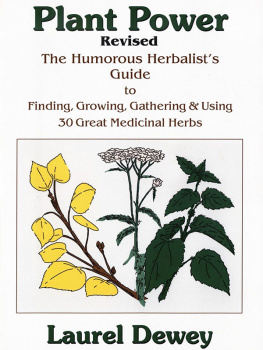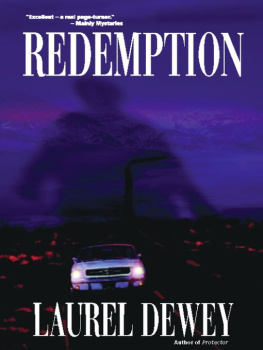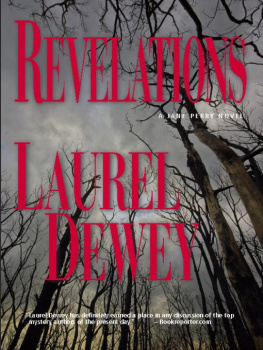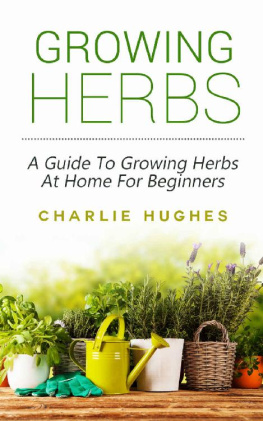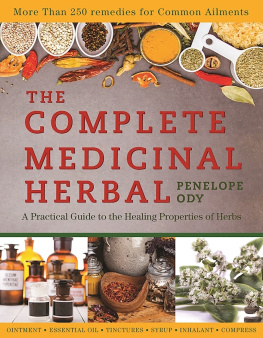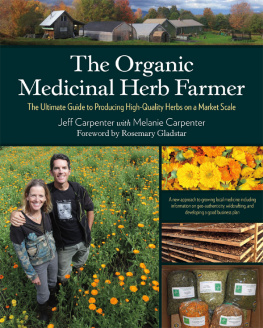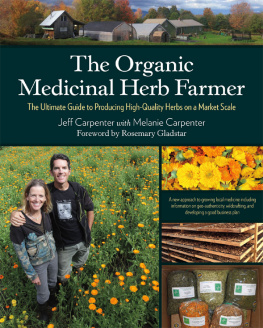PLANT POWER
(Revised Edition)
The Humorous Herbalists Guide To Finding, Growing, Gathering & Using 30 Great Medicinal Herbs
By Laurel Dewey
Illustrations by Jack Jones

PLANT POWER
Copyright 2001, 2012 by Laurel Dewey
This publication is a creative work fully protected by all applicable rights. All rights reserved. No portion of this book may be reproduced or transmitted in any form or by any means, electronic or mechanical, including fax, photocopy, recording, or any information storage or retrieval system by anyone except the purchaser for his or her own use. Plant Power Revised is not intended as medical advice, but as suggested complementary therapeutic regimens, to be considered only if deemed adequate by both patients and their chosen health professional. It is written solely for informational and educational purposes.
The Story Plant
The Aronica-Miller Publishing Project, LLC
P.O. Box 4331
Stamford, CT 06907
E-book ISBN-13: 978-1-61188-039-7
Visit our website at www.thestoryplant.com
Like Laurel Dewey on Facebook at https://www.facebook.com/pages/Laurel-Dewey-Author/200115782067
All rights reserved, which includes the right to reproduce this book or portions thereof in any form whatsoever, except as provided by US Copyright Law.
For information, address The Story Plant.
Previously published by Safe Goods/New Century Publishing
First Story Plant Publication: June 2012
Printed in The United States of America
Here is calm so deep, grasses cease waving
Wonderful how completely everything in
wild nature fits into us,
as if truly part and parent of us.
The sun shines not on us, but in us.
The rivers flow not past, but through us,
thrilling, tingling, vibrating every fiber and
cell of the substance of our bodies,
making them glide and sing.
John Muir

Also by Laurel Dewey
THE HUMOROUS HERBALIST
A Practical Guide to Leaves, Flowers, Roots, Barks & Other Neat Stuff (1996)
Dedication
This book is dedicated to:
Mom & Dad
Thank you for always encouraging me to use my full potential.
I may have been a late bloomer, but Ive almost outlived those Bront sisters.
Granny
Thank you for teaching me one of lifes most important lessons:
No one can make you look stupid unless you allow it.
I know youre listening.
Unk
Thank you for insisting that I write what makes me happy.
Im finally following that advice.
To all the herbalists & natural healers that have lived and are yet to be born.
Thank you for being willing to travel the road less taken.
Its not always easy, but it has a much better view.
Acknowledgements
No book is written without the assistance of others.
Many thanks to Jack Jones for the illustrations, Richard D. Burns and Mark Dodge for the layout, Amy Lawrence for the creativity, M&D Editing for tightening it up, John Duvall for the great formulas, Ken Kuhns and the Peach Valley CSA Farm for the education and memorable lunches, Pat Noel for giving a little herb column a big chance and to the many herbalists, wildcrafters and teachers along the way who helped give life to this book.
While I encourage readers to take more responsibility for their health and wellbeing, this book should not be considered a replacement for intelligent medical advice. At various times in our lives, we all need a qualified perspective from someone who can discuss the various treatments available for any number of health problems and concerns. That qualified perspective may come from a medical doctor, a naturopathic physician, a traditional Chinese medical doctor, an acupuncturist, a reflexologist or a skilled herbalist. The options are out there and I advise everyone to take advantage of them.
While this book may help you on your journey, it is not meant to take the place of any physician or holistic professional. This book is also not intended to treat, diagnose or prescribe. The information presented within these pages is meant to educate, enlighten and inform. Pregnant or nursing women should always consult a doctor or qualified holistic professional before using herbal therapy.
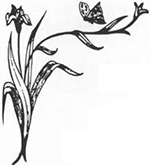
And then the day came
when the risk
to remain tight in a bud
was more painful than the risk
it took to blossom.
Anais Nin
Introduction
A FEW WEEKS AFTER the release of my first book, The Humorous Herbalist, people started asking me when I was going to write my next book. My next book?! was my usual reply. I was still recovering from the long, solitary hours spent writing and editing hundreds of pages. The thought of delving into another tome to herbal healing was the last thing on my mind.
But that didnt mean I wasnt willing to at least think about the idea. For two years I considered various ideas that would entice readers. As with The Humorous Herbalist, I wanted to write a book that I would want to read. It would have to be reader-friendlynever complicated and always infused with humor and interesting information to keep people turning the pages.
But there would also have to be something moresomething I wasnt yet able to put my finger on.
During this two year period, I wasnt spending every waking hour dreaming up the next herbal offering. Nearly every month of the year, I traveled from coast to coast attending alternative health shows, book conventions and herbal symposiums. I lectured and taught herb classes that included everyone from 10 year olds to senior citizens. I had the opportunity to meet many people and I began to notice things that bothered me.
There seemed to be a desire by many practitioners in alternative medicine to create an aura of mystery when discussing the use of herbs. This mystery only served to separate those who have the knowledge from those in search of the knowledge. What, in my opinion, should be an open exchange of age-old information, had turned into a kind of elitist mentality by many in the alternative health field.
For centuries, herbal medicine belonged to the people. There was an intuitive bridge between the plants and the people. Granted, most of those people lived in the backwoods and distant valleys of the world where the mind was allowed to connect to the voice of nature. But there was always a willingness by everyone to share the healing knowledgeto pass it down as one generations gift to the other. There were no rights or patents to the herbs because everyone knew that you cant patent nature.
But then science entered the picture. Researchers were tripping over themselves in an attempt to isolate what they loved to refer to as active compounds in herbs. By isolating these supposed active ingredients, and then manipulating them in a lab, they could produce a standardized herbal product deemed better than nature itself. And since science was able to alter the herbs natural form, they were now finally able to patent nature. Product labels were filled with multi-syllabic words that no one but clinical herbalists and lab researchers understood. Nevertheless, the public was enticed to try the products, always with the promise of fast, reliable, guaranteed results. In one fell swoop, science entered the herbal world with the same mindset that existed in the drug industry.

